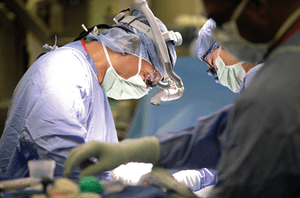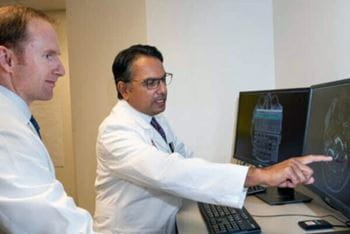
Indiana University School of Medicine neurosurgical oncologists, which include the only fellowship-trained neuro-oncologists in the state of Indiana, lead the way in surgical innovation. The department has the only gamma knife stereotactic radiosurgery program in the state and also brought surgically implanted brachytherapy in the form of gamma tiles to the patients of Indiana. IU School of Medicine is one of the sites for a national clinical trial comparing local control of brain metastases with surgical resection and either external beam radiation or surgically implanted radiation therapy. Laser interstitial thermal therapy is also part of the armamentarium of surgical neuro-oncologists, allowing them to treat deep seated tumor or radiation necrosis through a 5 mm skin incision.
 Multi-disciplinary Team
Multi-disciplinary TeamThe neuro-oncology section is part of a multidisciplinary team of physicians treating patients with brain tumors. In addition to neurosurgeons, the team consists of neurologists, neuropathologists, neuro-oncologists and radiation oncologists. Surgical offerings include open complex microsurgical approaches for intrinsic and extra-axial tumors, complex surgical resection and reconstruction of spinal primary and metastatic lesions, intraoperative MRI (IMRIS) assisted resection of low-grade brain tumors, advanced, minimally invasive and cutting edge endoscopic skull base approaches in collaboration with the Department of Otolaryngology—Head and Neck Surgery (neurotology and rhinology), and awake craniotomy with cortical mapping. State-of-the-art equipment is available to advance the safety of these complex microsurgical procedures, including frameless stereotactic navigation, intraoperative imaging, fluorescence guidance, O-arm and neuro-physiology/neuro-monitoring services.
Neuro-oncology Fellowship
The department offers a one-year oncology/skull base fellowship experience in managing complex brain tumors. The fellowship opportunity offers participation in a broad range of complex cranial procedures. Fellows are trained by department fellowship-trained faculty physicians at multiple hospitals in Indianapolis. The caseload includes approximately 350 operative cases each year—some with exposure to radio-surgical techniques using Novalis, Cyberknife and Gamma Knife.








